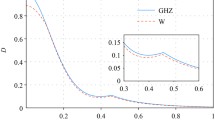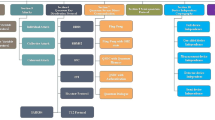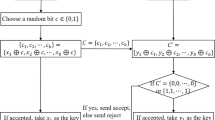Abstract
A robust and efficient quantum key agreement (QKA) protocol is presented with decoherence-free (DF) states and single-particle measurements. Compared with all the previous QKA protocols, which are designed in ideal condition, this protocol can not only guarantee both the security and fairness of the shared key but also be immune to collective decoherence. In addition, our protocol has a high intrinsic efficiency due to the utilization of the delayed measurement technique. Finally, we show that the proposed protocol is secure against the attacks from both outside eavesdroppers and inside dishonest participants.

Similar content being viewed by others
References
Trappe, W., Wang, Y., Liu, K.J.R.: Resource-aware conference key establishment for heterogeneous networks. IEEE/ACM Trans. Netw. 13, 134–146 (2005)
Steiner, M., Tsudik, G., Waidne, M.: Key agreement in dynamic peer groups. IEEE Trans. Parallel Distrib. Syst. 11, 769 (2000)
Tseng, Y.M.: Weakness in simple authenticated key agreement protocol. Electron. Lett. 36, 48 (2000)
Menezes, A.J., Oorscot, P.C., Vanstone, S.A.: Handbook of Applied Cryptography. CRC Press, Boca Raton (1997)
Shor, P.W.: Algorithms for quantum computation: Discrete logarithms and factoring. In: Proceedings of 35th Annual Symposium on Foundations of Computer Science, pp. 124–134. IEEE, Los Alamitos (1994)
Grover, L.K.: A fast quantum mechanical algorithm for database search. In: Proceedings of 28th Annual ACM Symposium on the Theory of Computing, pp. 212–219. ACM, Philadelphiapp (1996)
Gisin, N., Ribordy, G., Tittel, W., Zbinden, H.: Quantum cryptography. Rev. Mod. Phys. 74, 145–195 (2002)
Bennett, C.H., Brassard, G.: Quantum cryptography: Public key distribution and coin tossing. In: Proceedings of IEEE International Conference on Computers, Systems and Signal, pp. 175–179. IEEE, Bangalore (1984)
Sikora, J.: On the existence of loss-tolerant quantum oblivious transfer protocols. Quantum Inf. Comput. 12(7–8), 609–619 (2012)
Ma, J.J. et al.: Semi-loss-tolerant strong coin flipping protocol using EPR pairs. Quantum Inf. Comput. 12(5–6), 490–501 (2012)
Ekert, A.K.: Quantum cryptography based on Bells theorem. Phys. Rev. Lett. 67, 661–663 (1991)
Deng, F.G., Long, G.L.: Controlled order rearrangement encryption for quantum key distribution. Phys. Rev. A 68, 042315 (2003)
Guo, F.Z., Qin, S.J., Gao, F., et al.: Participant attack on a kind of MQSS schemes based on entanglement swapping. Eur. Phys. J. D 56, 445 (2010)
Tan, Y.G., Cai, Q.Y.: Practical decoy state quantum key distribution with finite resource. Eur. Phys. J. D 56, 449–455 (2010)
Gao, F., Guo, F.Z., Wen, Q.Y., Zhu, F.C.: On the information-splitting essence of two types of quantum key distribution protocols. Phys. Lett. A 355, 172–175 (2006)
Long, G.L., Liu, X.S.: Theoretically efficient high-capacity quantum-key-distribution scheme. Phys. Rev. A 65, 032302 (2002)
Sun, Y., Wen, Q.Y., Gao, F., Zhu, F.C.: Robust variations of the Bennett-Brassard 1984 protocol against collective noise. Phys. Rev. A 80, 032321 (2009)
Zhou, N., Zeng, G., Xiong, J.: Quantum key agreement protocol. Electron. Lett. 40, 1149 (2004)
Chong, S.K., Tsai, C.W., Hwang, T.: Improvement on quantum key agreement protocol with maximally entangled states. Int. J. Theor. Phys. 50, 1793–1802 (2011)
Chong, S.K., Hwang, T.: Quantum key agreement protocol based on BB84. Opt. Commun. 283, 1192–1195 (2010)
Shi, R.H., Zhong, H.: Multi-party quantum key agreement with bell states and bell measurements. Quantum Inf. Process 12, 921–932 (2013)
Liu, B., Gao, F., Huang, W., Wen, Q.Y.: Multiparty quantum key agreement with single particles. Quantum Inf. Process 12, 1797–1805 (2013)
Zurek, W.H.: Decoherence and the transition from quantum to classical. Phys. Today 44, 36 (1991)
Laflamme, R., Miquel, C., Paz, J.P., Zurek, W.H.: Perfect quantum error correcting code. Phys. Rev. Lett. 77, 198 (1996)
Wang, X.B.: Quantum error-rejection code with spontaneous parametric down-conversion. Phys. Rev. A 69, 022320 (2004)
Zanardi, P., Rasetti, M.: Noiseless quantum codes. Phys. Rev. Lett. 79, 3306 (1997)
Kwiat, P.G., Berglund, A.J., Altepeter, J.B., White, A.G.: Experimental verification of decoherence-free subspaces. Science 290, 498 (2000)
Ollerenshaw, J.E., Lidar, D.A., Kay, L.E.: Magnetic resonance realization of decoherence-free quantum computation. Phys. Rev. Lett. 91, 217904 (2003)
Huang, W., Wen, Q.Y., Liu, B., Gao, F., Sun, Y.: Robust and efficient quantum private comparison of equality with collective detection over collective-noise channels. Sci. China Phys. Mech. Astron. 56, 1670–1678 (2013)
Cabello, A.: Six-qubit permutation-based decoherence-free orthogonal basis. Phys. Rev. A 75, 020301 (2007)
Huang, W., Wen, Q.Y., Liu, B., Gao, F.: A general method for constructing unitary operations for protocols with collective detection and new QKD protocols against collective noise. e-print arXiv:quant-ph/1210.1332v2 (2012)
Boileau, J.C., Gottesman, D., Laflamme, R., Poulin, D., Spekkens, R.W.: Robust polarization-based quantum key distribution over a collective-noise channel. Phys. Rev. Lett. 92, 017901 (2004)
Huang, W., Wen, Q.Y., Jia, H.Y., Qin, S.J., Gao, F.: Fault tolerant quantum secure direct communication with quantum encryption against collective noise. Chin. Phys. B 21, 100308 (2012)
Li, X.H., Deng, F.G., Zhou, H.Y.: Efficient quantum key distribution over a collective noise channel. Phys. Rev. A 78, 022321 (2008)
Zhang, Z.J.: Robust multiparty quantum secret key sharing over two collective-noise channels. Phys. A 361, 233–238 (2006)
Li, Y.B., Qin, S.J., Zheng, Y., Huang, W., Sun, Y.: Quantum private comparison against decoherence noise. Quantum Inf. Process. 12, 2191–2205 (2012)
Huang, W., Guo, F.Z., Huang, Z., Wen, Q.Y., Zhu, F.C.: Three-particle QKD protocol against a collective noise. Opt. Commun. 284, 536–540 (2011)
Yang, Y.G., Wen, Q.Y.: Arbitrated quantum signature of classical messages against collective amplitude damping noise. Opt. Commun. 283, 3198–3201 (2010)
Wang, T.Y., Wei, Z.L.: One-time proxy signature based on quantum cryptography. Quantum Inf. Process. 11, 455–463 (2012)
Huang, W., Wen, Q.Y., Liu, B., Gao, F., Sun, Y.: Quantum key agreement with EPR pairs and single-particle measurements. Quantum Inf. Process. 13, 649–663 (2012). doi:10.1007/s11128-013-0680-z
Deng, F.G., Long, G.L., Wang, Y., Xiao, L.: Increasing the efficiencies of random-choice-based quantum communication protocols with delayed measurement. Chin. Phys. Lett. 21, 2097 (2004)
Bourennane, M., Eibl, M., Gaertner, S., Kurtsiefer, C., et al.: Decoherence-free quantum information processing with four-photon entangled states. Phys. Rev. Lett. 92, 107901 (2004)
Shannon, C.: A mathematical theory of communication. Bell Syst. Tech. J. 28, 656–715 (1949)
Gao, F., Qin, S.J., Wen, Q.Y., Zhu, F.C.: A simple participant attack on the brádler-dušek protocol. Quant. Inf. Comput. 7, 329–334 (2007)
Gao, F., Qin, S.J., Wen, Q.Y.: Improving the security of multiparty quantum secret sharing against an attack with a fake signal. Phys. Lett. A 357, 101–103 (2006)
Gao, F., Guo, F.Z., Wen, Q.Y., Zhu, F.C.: Experimental demonstration of a quantum protocol for byzantine agreement and liar detection. Phys. Rev. Lett. 101, 208901 (2008)
Huang, W., Zuo, H.J., Li, Y.B.: Cryptanalysis and improvement of a multi-user quantum communication network using X -type entangled states. Int. J. Theor. Phys. 52, 1354–1361 (2013)
Gisin, N., Ribordy, G., Tittel, W., Zbinden, H.: Quantum cryptography. Rev. Mod. Phys. 74, 145–195 (2002)
Deutsch, D., Ekert, A., Jozsa, R., et al.: Quantum privacy amplification and the security of quantum cryptography over noisy channels. Phys. Rev. Lett. 77, 2818 (1996)
Deng, F.G., Long, G.L., Liu, X.S.: Two-step quantum direct communication protocol using the Einstein-Podolsky-Rosen pair block. Phys. Rev. A 68, 042317 (2003)
Deng, F.G., Long, G.L.: Secure direct communication with a quantum one-time pad. Phys. Rev. A 69, 052319 (2004)
Chen, Z.W., Zhao, B., Chen, Y.A., Schmiedmayer, J., Pan, J.W.: Fault-tolerant quantum repeater with atomic ensembles and linear optics. Phys. Rev. A 76, 022329 (2007)
Acknowledgments
This work is supported by NSFC (Grant Nos. 61272057, 61170270, 61100203, 61003286, 61121061, 61103210), NCET (Grant No. NCET-10-0260), SRFDP (Grant No. 2009000 5110010), CPSF (Grant No. 2013M530561), Beijing Natural Science Foundation (Grant Nos. 4112040, 4122054), the Fundamental Research Funds for the Central Universities (Grant No. 2011YB01), BUPT Excellent Ph.D. Students Foundation (Grant No. CX201334) and Beijing Higher Education Young Elite Teacher Project (Grant Nos. YETP0475, YETP0477).
Author information
Authors and Affiliations
Corresponding author
Rights and permissions
About this article
Cite this article
Huang, W., Su, Q., Wu, X. et al. Quantum Key Agreement Against Collective Decoherence. Int J Theor Phys 53, 2891–2901 (2014). https://doi.org/10.1007/s10773-014-2087-8
Received:
Accepted:
Published:
Issue Date:
DOI: https://doi.org/10.1007/s10773-014-2087-8




